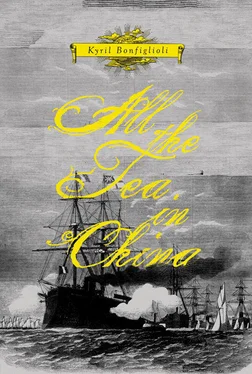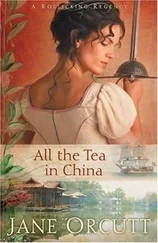“I am going to live, Van Cleef,” he rasped faintly, “live. Can you hear me?” I nodded, encouragingly.
“Live to make you wish you never had lived.” I started back, but not before he had spat, feebly but disgustingly, into my ear. I should have known better: people of such vileness do not change, even in the presence of death. As the men carried him to the receiving ship he was making an ugly, gasping sort of titter which no doubt sounded to him like a bellow of ribald mirth.
(There was an excellently-appointed sick-bay on this receiving ship, I was assured, and if necessary Lubbock would be carried to Macao where a neat little hospital was maintained by a Pomeranian medical missionary called Gutzlaff who was one of only two Europeans who could speak, read and write the Chinese tongue and whose nimble intellect was able to reconcile the creation of twenty million opium addicts with the opportunity to distribute Protestant Bibles and Cockle’s pills. This Prussian Christian and Lubbock deserved each other.)
Then our chests of opium were brought up and flowed into the receiving ship. Our schroff , and the grand schroff on the larger vessel, made a show of marking off each chest but there was little need: pilfering was unknown in that otherwise dishonest trade. Captain Knatchbull went, in his good uniform, to pay calls on old acquaintances aboard the receiving vessel, taking his comprador , servants and both remaining watch-keeping officers with him for the look of the thing.
The air of Lin Tin must have been sovereign, for Blanche’s headache vanished like the dew upon a Dutch tulip as soon as we were alone together.
When the party returned after several hours — none too soon for me because the heavy climate was not conducive to prolonged lessons in venery, such as Blanche loved — the Captain’s face was long and glum. Although we were the first at Lin Tin the Chinese were confident that other and larger vessels would soon be at the anchorage and therefore they would pay no more than an average of £185 per chest of the drug, the poorer grades making up for the better. (At Namoa we had taken an average of £210 per chest although the overall quality we had sold there had been lower.) Why, then, had we not sold all at Namoa? For one thing, the country trade, so early in the season, although glad to pay high prices to satisfy a craving market, had not the resources to buy large quantities until their retail profits came in. More important, each ship had to sell a plausible quantity of the drug at Lin Tin in order to keep the mandarins, the Hong merchants, the Hoppo (all of whom, of course, took large, illegal commissions on each transaction) and even the proprietors of the receiving ships, content.
To my surprise, we did not stay at Lin Tin to deal but set sail the next morning for Whampoa, the official unloading port, thirteen miles below Canton. It was explained to me that the people of the receiving ship would deal for us capably and honestly.
At Whampoa an absurd Chinese official, calling himself the port doctor, came aboard to give us “pratique ”. This means that such an official should satisfy himself that there are not, and have not recently been, any cases of infectious disease aboard. In practice it meant that there was a long and bitter argument as to how much he would take to go away.
The cargo we unloaded there into crab-boats was scarcely plausible as the entire contents of a ship’s hold: the rhinoceros horns and elephant tusks, a few bags of American ginseng (which the Chinese prized more than their own) a few tiger- and leopard-skins, a small but valuable box of tigers’ whiskers, some furs and woollen goods and, for the European community, liquor, letters, journals, books, hats, corsets and the like. There would of course be no comment on the paucity of our cargo — everyone understood perfectly that the bulk of it had been discharged elsewhere.
Leaving in the John Coram only the Second (now acting-First) Mate, Blanche and a handful of teetotallers as skeleton crew, the rest of the ship’s company followed the goods up the Pearl River to Canton, or rather to that suburb where the Factories were permitted to exist. (Why they were called “Factories” is a mystery to me for nothing was manufactured there but profits.) Long before we reached the Factories, however, we seemed to be in a city upon the water: I swear one could have walked for a mile at least across the tightly-packed boats without the least risk of a wetting. The racket and the stench were quite enervating. Our Chinese boatmen pointed our craft into a narrow alley between these floating houses, stowing the oars and using paddles and, finally, boathooks to squeeze a passage. I was gazing entranced at a wonderful houseboat full of charming young ladies when Peter nudged me. “Canton,” he said, pointing. There it stood; a grim, thirty-foot wall, each side more than a mile long and pierced by imposing gates.
“They say there are more people inside those walls than in London,” said Peter. “Add the population of the suburbs and of this water-city and the number cannot be much less than two millions.” Much impressed by this, for large figures always make me think of money, my eyes nevertheless strayed back to the houseboat of the young ladies. It was a splendid building — wonderfully carved and gilded balconies with intricate railings sprouted from every part of it and each balcony held a richly-clad young lady or two, whispering, tittering and nodding at us.
“Calm yourself, Karli,” said Peter, drily, “they are forbidden to admit you onto the Flower Boats.”
“Then why are they at such pains to make themselves attractive?”
“‘Nightee time come’,” he replied enigmatically.
“Which means?”
“It is a pidgin-English phrase of wide application: it means that, after dark, officials cannot see regulations being broken.”
“Then …?”
“ No , Karli. Below decks in that boat of sin there are quite half a dozen burly pimps. If you ventured aboard you would, at the very best, be beaten and robbed but, more likely, you would never be seen again. Small parcels of you, neatly wrapped, would be thrown overboard when the tide was running. If you must sample Chinese womanhood, contain yourself until we are back at Whampoa, where there are many complacent and hygienic young persons of fine quality. But I warn you, anything you may have heard about the, ah, eccentric arrangements of the Chinese women’s anatomy is simply one of those ‘bouncers’ with which sailormen love to tease landsmen. They are exactly like English women in that area.”
“Oh,” I said, a little put out, for I had been looking forward to making love on a T-shaped bed.
“But somewhat smaller,” he added thoughtfully, “although whether this is due to the application of alum-water I cannot say.”
At that moment we bumped, at last, at the foot of the landing stairs to the English Factory’s garden. In front of us, across an elegant shrubbery and garden, rose a flagstaff from which bravely waved the Union Jack. Over to the left, two more flagstaffs bore the flags of France and the United States of North America.
Meanwhile, our Captain’s face was darkening with anger as the schroff bickered with the boatmaster over the price of our passage. This darkening or scowling arose from the evident fact that the schroff was having difficulty in making himself understood; he had done well at Namoa for his native tongue was Foo-Kien, but his command of Cantonese was clearly not as perfect as he had claimed. At last a bargain was struck and we poured off the boat and into the garden. At the top of the stairs my heart leaped up, for to my right, over a high wall, I saw the flag of Holland herself.
Читать дальше












